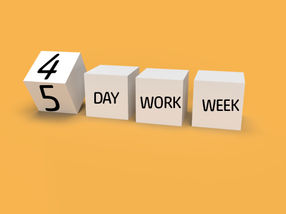HR practices have both positive and negative effects on employee mental health, research finds
Poor mental health among employees has an enormous impact on the global economy, costing companies about $1 trillion annually in lost productivity by some estimates — and the toll is only expected to rise. But as employers scramble to address mental health issues, their efforts could actually be backfiring.

Brooke Cagle / Unsplash
Workplace resources and programs intended to improve employees’ mental health — and by extension, their performance and productivity — aren’t one-size-fits-all, according to new research from Colorado State University’s College of Business.
The research found that human resource practices’ impact on employees’ mental health hinges on a concept known as organizational identification, which reflects their sense of belonging within the organization or whether they feel it shares their values.
“Organizations that have these types of practices are generally hoping to improve employees’ overall mental health,” said the management department’s Sherry Fu. “However, these practices can have negative effects on employees, even though their intention might not be to hurt employees.”
In “High Performance Work Systems and Employee Mental Health: The Roles of Psychological Empowerment, Work Role Overload, and Organizational Identification,” an article published in Human Resource Management, Fu and her coauthors examined the effect of high-performance work systems on employee mental health.
High performance work systems can both empower and overwhelm employees
A high-performance work system is a group of interconnected HR policies and practices. The article proposes that these HR practices can affect employee mental health through psychological empowerment or work-role overload.
Four factors make up an employee’s feelings of psychological empowerment: a sense of meaning in one’s work role, self-determination in task completion, competency in one’s work role and the impact of one’s work.
Work-role overload, on the other hand, occurs when employees feel they have more demands than resources. Employees feel overwhelmed by their workload, which brings an increased risk of mental fatigue that may cause psychological health problems over time.
Take, for example, an initiative intended to give employees more autonomy. On paper, it could seem universally positive, but how it affects employees is likely to vary. Some employees might feel empowered and motivated, but others could feel overwhelmed and like they don’t have enough support.
“Having too much autonomy and having to decide what to do and how to do it sometimes can be a burden, too,” Fu said. “Having too much of that can feel like you have a lot of responsibility to develop procedures instead of having someone explain the established procedures to you.”
A study of employees in South Korea
The researchers’ findings are based on a study of 999 employees across 174 South Korean organizations. Surveying employees at a wide variety of organizations was important because each has different policies and HR practices, Fu said.
“Because (coauthor Kibok Baik) has a network in South Korea, he was able to recruit multiple organizations, and that’s beneficial in terms of making our findings more generalizable to more organizations,” she said.
During the study, participating employees were asked to complete a paper-and-pencil survey. It included questions on mental health, such as “Are there times at work when you feel so exasperated that you think to yourself that ‘life is all really too much effort’?” and “Do you tend to feel restless and tense?” It also asked participants to respond to statements about high-performance work systems, work-role overload, psychological empowerment and organizational identification.
Overall, the study found that high performance work systems can affect employees either positively or negatively — and that how strongly an employee identifies with their workplace makes a difference.
“We found that people who have higher identification with the organization are less likely to suffer from the negative impact,” Fu said. “Because they already identify with the organization, they tend not to interpret these policies as being exploitative. They’re also more likely to feel empowered and feel that their work has more meaning and enjoy the autonomy they have.”
People who have lower identification with their workplaces, however, are more likely to experience negative effects from HR policies and practices.
What employers can do to help employees’ mental health
It’s long been known that when employees struggle with their mental health, it often impacts their engagement, job satisfaction, absenteeism, turnover and job performance. Amid a growing global mental health crisis, Fu and her coauthors’ research offers practical advice to employers and managers.
“We think that individuals do differ case by case,” Fu said. “One thing managers can do is really understand each of their employees themselves. They have different perceptions on what’s going on, and they have different interpretations of the policies and practices.”
The researchers’ findings suggest that organizations should either recruit people with higher identification with the organization or work to improve how strongly employees identify with it, Fu said.
“There are things that managers or organizations as a whole can do to really improve people’s feelings of belongingness and feelings of identification with their group or organization,” she said.
That could mean encouraging employees to socialize or offering more opportunities for new employees to bond.
“It’s not like you’re either an identifier or you’re not,” Fu said. “It’s always up to the things happening around you and the people around you to make you feel like this place is the right place.”

































































